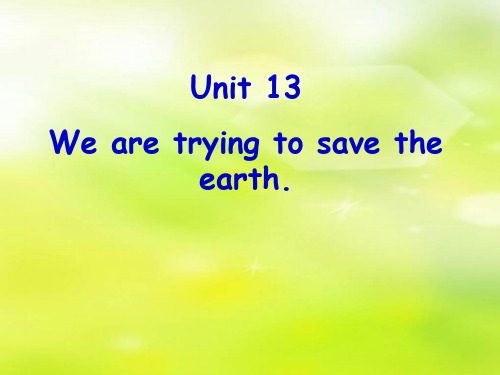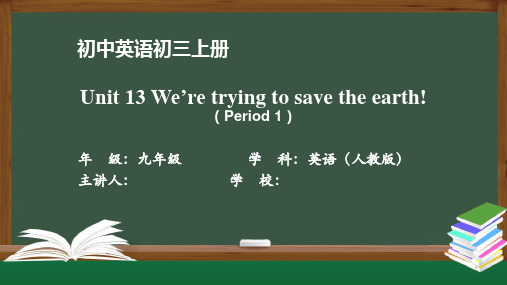Unit13Wearetryingtosavetheearth!(第1-5课时)(1).
- 格式:doc
- 大小:408.50 KB
- 文档页数:30


Unit 13 We’re trying to save the earth(第1课时)说课稿一. 教材分析我们正在使用的教材是《PEP小学英语》,本节课是Unit 13的第一课时,主题是“We’re trying to save the earth”。
这一单元的主要内容围绕着环保意识展开,通过学习让学生们了解到保护环境的重要性,并能够运用所学知识表达对环保的看法。
教材中包含了丰富的图片、对话和活动,有助于激发学生的学习兴趣,提高他们的语言能力。
二. 学情分析本节课的对象是小学高年级的学生,他们已经具备了一定的英语基础,学习积极性较高。
学生们在日常生活中对环保有了一定的认识,但还需要通过课堂学习进一步加深理解。
此外,学生们在学习过程中注重合作和交流,教师可以充分利用这一点,互动性强的小组活动,提高教学效果。
三. 说教学目标1.知识目标:让学生掌握单词“trying, save, earth, plant, tree, pollution,clean”等,并能够熟练运用句型“We’re trying to…”表达自己的行为目的。
2.能力目标:通过课堂学习,提高学生的听说读写能力,使他们能够用英语简单讨论环保话题。
3.情感目标:培养学生关爱地球、保护环境的意识,养成良好的环保习惯。
四. 说教学重难点1.重点:单词“trying, save, earth, plant, tree, pollution, clean”的认读及运用;句型“We’re trying to…”的表达。
2.难点:对环保话题的讨论,以及如何在实际生活中践行环保。
五. 说教学方法与手段本节课采用任务型教学法,通过情境创设、小组合作、互动交流等手段,引导学生主动参与学习,提高他们的语言运用能力。
同时,运用多媒体教学手段,展示环保图片和视频,增强学生的直观感受,激发学习兴趣。
六. 说教学过程1.导入:以一首环保歌曲《We’re saving the earth》导入课堂,让学生在轻松愉快的氛围中进入学习状态。

Unit 13 We are trying to save the earth!第一课时Section A(1a ~ 2d)I. 知识目标重点单词1. litter v.乱扔;n. 垃圾;2. ugly adj. 丑陋的;3. advantage n. 优点;4. cost v. 花费;5. wooden adj. 木制的;6. bottom n. 底部;7. fisherman n. 渔民;8. coal n. 煤;9. plastic adj. 塑料的; 10. takeaway n. 外卖食物;11. bin n. 垃圾箱重点词组1. at the bottom of the river在河床底部2. be full of the rubbish充满了垃圾3. throw litter into the river把垃圾扔入河中4. land pollution土地污染5. play a part in cleaning it up尽一份力把它清理干净6. make a difference产生影响7. fill the air with black smoke使空气中充满了黑烟8. cut down air pollution减少空气污染重点句式1. Everyone in town should play a part in cleaning it up. 城里的每个人都应当尽一份力把它清理干净。
2. To cut down air pollution, we should take the bus or subway instead of driving.为了减少空气污染,我们应当乘坐公汽或地铁而不是开车。
II. 课堂环节§自主学习方案【自学自查】根据汉语提示完成单词。
1. We should put up notice to stop from littering (乱扔)。

Unit 13 We’re trying to save theearth。
全英文说课稿Hello everyone。
good morning。
I am honored to present my lesson on Unit 13: We're Trying to Save the Earth。
n A d 1 1a-2c from Book Three。
My n will consist of seven parts。
including an analysis of the teaching material。
teaching aims and key points。
analysis of the students。
teaching methods。
teaching aids。
teaching re。
and blackboard design.To begin。
let's discuss the analysis of the teaching material。
This unit is the final part of middle school and is a XXX and two types of voices。
XXX.Moving on to the teaching aims。
we aim to teach the students the names of XXX。
kangaroos。
chimpanzees。
XXX。
XXX describe these animals。
such as furry。
enormous。
playful。
aggressive。
gray。
spotted。
and XXX.Next。
let's analyze the students。
Our target audience is middle school students who have basic knowledge of EnglishXXX methods to their level and ensure that the material is XXX.Our teaching methods will include a n of lecture-based teaching。


UNIT13We'retryingtosavetheearth原文与翻译《牛津初中英语》充分体现了《新课标》的诸多精神。
该教材具有两大特点。
下面是小偏整理的UNIT13We'retryingtosavetheearth 原文与翻译,感谢您的每一次阅读。
UNIT13We'retryingtosavetheearth原文与翻译SectionA1bListenandcompletethesentences.Tony:Hey,Mark,maybewecouldgoswimmingintheriverlaterthi safternoon.Mark:Idon’tthinkIwanttogo,Tony.Tony:Whynot?Mark:Iwastherelastweekendandtheriverwasreallydirty.Eventh ebottomoftheriverwasfullofrubbish,andtherewerenomorefishforf ishermentocatch.Tony:Noway!Itusedtobesoclean.Infact,ithasalwaysbeentheni cestriverinthistown.Mark:Notanymore.Ithinkpeoplearethrowinglitterintotheriver. Factoriesarealsoputtingwasteintotheriver.Tony:That’sterrible!Weshouldwritetothegovernment.Theys houldclosedownthefactories.Mark:Goodidea!ButIthinkeveryoneinthistownshouldhelptocl eanuptheriver,too.Everyoneshouldplayapart,notjustthegovernm entSectionA2aListentotheinterview.thekindsofpollutionthatJasonandSusan talkabout.Interviewer:T odaywe’retalkingtoJason andSusanaboutenvir onmentalproblems.JasonandSusan,canyoutellusaboutsomeofth eproblemsyou’veseen?Jason:Ithinkoneproblemisthattheairisbadlypolluted.Ihardlye verseeblueskiesanymore.Susan:Yes,andIusedtoseethestarsclearly.Interviewer:Whatdoyouthinkhascausedthisproblem?Susan:Well,therearemorecarsontheroadthesedays.Jason:Andfactoriesthatburncoalalsopollutetheairwithalotofb lacksmoke.Interviewer:Whatotherproblemsdoyousee?Susan:Iguessthere’stoomuchrubbishandwasteinthestreets.Jason:Yes!Everydaypeoplearethrowingawaythingslikewoode nchopsticks,plasticbowlsandplasticbags.Susan:They’realsolitteringinpublicplaces,forexample,durin gpicnicsinparks.Thisisturningbeautifulplacesintouglyones.Interviewer:You’reright.Theseareseriousproble msforourenv ironment.Next,let’stalkaboutthethingswecandotohelp.SectionA2bListenagainandcompletethesentences.Interviewer:T odaywe’retalkingtoJasonandSusanaboutenvir onmentalproblems.JasonandSusan,canyoutellusaboutsomeofth eproblemsyou’veseen?Jason:Ithinkoneproblemisthattheairisbadlypolluted.Ihardlye verseeblueskiesanymore.Susan:Yes,andIusedtoseethestarsclearly.Interviewer:Whatdoyouthinkhascausedthisproblem?Susan:Well,therearemorecarsontheroadthesedays.Jason:Andfactoriesthatburncoalalsopollutetheairwithalotofb lacksmoke.Interviewer:Whatotherproblemsdoyousee?Susan:Iguessthere’stoomuchrubbishandwasteinthestreets.Jason:Yes!Everydaypeoplearethrowingawaythingslikewoodenchopsticks,plasticbowlsandplasticbags.Susan:They’realsolitteringinpublicplaces,forexample,d urin gpicnicsinparks.Thisisturningbeautifulplacesintouglyones.Interviewer:You’reright.Theseareseriousproblemsforourenv ironment.Next,let’stalkaboutthethingswecandotohelp.SectionA2dRoleplaytheconversation.JasonandSusan,whatareyourideasforsolvingtheseproblems?Well,tocutdownairpollution,weshouldtakethebusorsubwayin steadofdriving.Yeah,orrideabike.Thereareotheradvantagesofbikeriding.It'sg oodforhealthitdoesn'tanythingGreatideas!Whataboutwastepollution?Mmm,Ithinksimplethingslikebringingabagtogoshoppingcan help.Istarteddoingthatayearago.Me,tooAlso,Inevertakewoodenchopsticksorplasticforkswhen Ibuytakeawayfood.Iusetheonesathome.Andremembertothrowrubbishinthebinsandkeeppublicplace scleanandbeautifulforeveryone.Sotogether,ouractionscanmakeadifferenceandleadtoabetter future!SectionA3aReadthepassageaboutsharksandcompletethefactsheetbelow.SavetheSharks!Manyhaveheardofsharkfinsoup.Thisfamousandexpensivedis hisespeciallypopularinsouthernChina.Butdoyourealizethaty ou’r ekillingawholesharkeachtimeyouenjoyabowlofsharkfinsoup?Whenpeoplecatchsharks,theycutofftheirfinsandthrowthesha rkbackintotheocean.Thisisnotonlycruel,butalsoharmfultotheenvir onment.Withoutafin,asharkcannolongerswimandslowlydies.Sharksar eatthetopofthefo odchainintheocean’secosystem.Iftheirnumber sdroptoolow,itwillbringdangertoalloceanlife.Manybelievethatsharkscanneverbeendangeredbecausethey arethestrongestintheirfoodchain.Butinfact,around70millionshark sarecaughtandtradedinthisindustryeveryyear.Thenumbersofsomekindsofsharkshavefallenbyover90percen tinthelast20to30years.Environmentalprotectiongroupsaroundthe world,suchasWildAidandtheWWF,areteachingthepublicabout“fi nning”.Theyhaveevenaskedgovernmentstodeveloplawstostopthesal eofsharkfins.Sofar,noscientificstudieshaveshownthatsharkfinsare goodforhealth,sowhyeatthem?Helpsavethesharks!SectionB1cListenandcheck(√)thethingsthatJuliaandJacktalkabout.Jack:Turnoffthelights,Julia.Itsaveselectricity.Julia:Oh,Iusuallydothat.Iwasjustinahurry.Jack:Isee.I’vejustreadabookwh ichgivesideasabouthowweca nsavetheenvironment.Forexample,youshouldturnofftheshowerw henyou’rewashingyourhair.Julia:Oh,Iwouldneverdothat.Ihaveveryshorthair.Itonlytakesaf ewminutestowash.Whatelsedoesitsay?Jack:Youshouldtakeyourownbagswhenyougoshopping.Julia:Oh,that’seasy.I’lldothatfromnowon.Whatelse?Jack:Peopleshouldstopridingincarsandstartridingbikes.Julia:Noway!Itwouldtakeme45minutestogettoschoolbybike!Jack:Butit’sgoodfortheenvironment!Besides,Ilikeridingmybi ke.Julia:Yes,andyoualsoliveclosetoschool!SectionB1dListenagain.Check(√)thethingsthatJuliaisdoingnow,thethings shewilldointhefutureandthethingsshewouldneverdo.Jack:Turnoffthelights,Julia.Itsaveselectricity.Julia:Oh,Iusuallydothat.Iwasjustinahurry.Jack:Isee.I’vejustreadabookwhichgiveside asabouthowweca nsavetheenvironment.Forexample,youshouldturnofftheshowerw henyou’rewashingyourhair.Julia:Oh,Iwouldneverdothat.Ihaveveryshorthair.Itonlytakesaf ewminutestowash.Whatelsedoesitsay?Jack:Youshouldtakeyourownbagswhenyougoshopping.Julia:Oh,that’seasy.I’lldothatfromnowon.Whatelse?Jack:Peopleshouldstopridingincarsandstartridingbikes.Julia:Noway!Itwouldtakeme45minutestogettoschoolbybike!Jack:Butit’sgoodfortheenvironment!Besides,Ilikeridingmybi ke.Julia:Yes,andyoualsoliveclosetoschool!SectionB2bReadthepassageandcompletethechartbelow.Rethink,Reuse,Recycle!Doyouoftenthrowawaythingsyoudon’tneedanymore?Have youeverthoughtabouthowthesethingscanactuallybeputtogoodu se?Nothingisawasteifyouhaveacreativemind.Youhaveprobablyn everheardofAmyHayes,butsheisamostunusualwoman.Shelivesin ahouseintheUKthatshebuiltherselfoutofrubbish.Thewindowsanddoorscomefromoldbuildingsaroundhertow nthatwerepulleddown.Thetopofthehouseisanoldboatturnedupsi dedown.Andthegateinfrontofherhouseismadeofrocksandoldglas sbottles.AmyrecentlywonaprizefromtheHelpSaveOurPlanetSociety.Thepresidentsaid,“Amyisaninspirationtousall.”Amyisn’ttheonlyonewhoisgoodatrecycling.JessicaWongfro mHongKongusesoldclothesthatpeop ledon’twearanymoretoma kebags.Shehasbeendoingthisforafewyearsnow.Sheopenedasmallshopwhereshesellsherbags,andshehasalso setupawebsitetosellthemonline.Sheespeciallylikestouseoldjeanst omakehandbags.Herbagsarecuteanduseful.“Iplantowriteabookaboutnewwaystouseoldclothes,”shesai d.“Ihopepeoplecanreadmybookandenjoyit!”WangTaosetupasmallbusinessinShanghaifouryearsago.Heisk nownforusingironandothermaterialsfromoldcarstomakebeautifu lartpieces.Somearelargepiecesthatlooklikeanimalsorhumans,and somearesmallerpiecesyoucanputathome.Themorepopularworks canevenbeseeninartshopsaroundthecity.WangTaohopestosetupa“metalart”themeparktoshowpeop letheimportanceofenvironmentalprotection.Notonlycantheartbri nghappinesstoothers,butitalsoshowsthatevencold,hardironcanb ebroughtbacktolifewithalittlecreativity.翻译:SectionA2d采访者:贾森和苏珊,对于解决这些问题,你们有什么想法?贾森:为了减少空气污染,我们应该乘坐公共汽车或者地铁,而不是开车。
Period 1
Section A 1(1a-2d)
I. Presentation
Show the picture of the earth and tell students the earth is polluted now.
For example: (1) The factories that burn coal pollute the air with a lot of black smoke.
(2) Factories put waste into the river.
(3) People should throw away litter in the bin.
(4)There are more cars on the road.
II. Learning
Here are some words related to different kinds of pollution. Write them in the box below. Then add more words.
loud music cars rubbish planes littering ships
factories smoking building houses mobile phones
noise pollution air pollution water pollution
____________ ___________ _____________
____________ ___________ _____________
____________ ___________ _____________
____________ ___________ _____________
Keys : noise pollution loud music planes mobile phones building houses air pollution factories smoking cars building houses water pollution ships rubbish littering factories
III. Listening
1. 1b Listen and complete the sentences.
What was the problem? The river was _____________. Even the
bottom (底部) of the river was full of
________. There were no more ______ for
fishermen (渔民) to catch.
What caused the problem? People are throwing _______ into the river.
Factories are putting ______ into the river. How should the problem be
solved?
We should write to the ____________ and
ask them to ___________ the factories.
Everyone should help to __________ the
river.
Keys: really dirty rubbish fish litter waste government
教学设
计
教学设
计。